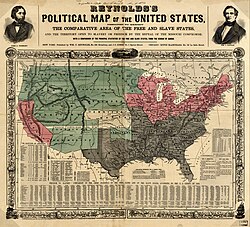Kansas–Nebraska Act

The Kansas–Nebraska Act of 1854 made the territories of Kansas and Nebraska, allowing the states to vote on whether slavery was legal or not. This law canceled the Missouri Compromise, which declared that slavery was not legal in those areas. It was passed on May 30, 1854. The Kansas-Nebraska Act angered many in the North who considered the Missouri Compromise to be a long-standing agreement. In the pro-slavery South, it was strongly supported.
After the Kansas-Nebraska Act was passed, pro-slavery and anti-slavery supporters rushed in to settle Kansas to affect the outcome of the first election held after the new law went into effect. Pro-slavery settlers carried the election but anti-slavery settlers claimed the results were fraudulent, and did not accept defeat. The resulting fighting in Kansas gave it the nickname "Bleeding Kansas".
Kansas–Nebraska Act Media
The United States after the Compromise of 1850 and the Gadsden Purchase. Douglas sought to organize parts of the area labeled as "Unorganized territory".
Stephen A. Douglas from Illinois argued – "The great principle of self-government is at stake, and surely the people of this country are never going to decide that the principle upon which our whole republican system rests is vicious and wrong."
Sam Houston from Texas was one of the few southern opponents of the Kansas–Nebraska Act. In the debate, he urged, "Maintain the Missouri Compromise! Stir not up agitation! Give us peace!"
Alexander Stephens from Georgia – "Nebraska is through the House. I took the reins in my hand, applied the whip and spur, and brought the 'wagon' out at eleven o'clock P.M. Glory enough for one day."
Thomas Hart Benton of Missouri – "What is the excuse for all this turmoil and mischief? We are told it is to keep the question of slavery out of Congress! Great God! It was out of Congress, completely, entirely, and forever out of Congress, unless Congress dragged it in by breaking down the sacred laws which settled it!"
This 1856 map shows slave states (gray), free states (pink), U.S. territories (green), and Kansas (white).






